Our approach to raising Nigerian dwarf goats and Nubian goats is rooted in our commitment to sustainable farming and animal welfare. We strived to create a nurturing environment where our goats can thrive. We intentionally kept our goat herd small. This ensured that our natural grazing areas never were over-exhausted.
No confinement and lots of room to play
Our goats had the privilege of approximately 2-3 acres of carefully fenced pasture at any given time. At TnF Farms, we rotated our animals through pastures so there was always something great to eat and the vegetation got an opportunity to grow back. These areas included a mix of open fields, shaded forests, and the serenity of a creek bottom where they could roam freely. This diverse environment offered them ample space to run, explore, and engage in their natural behaviors.
Since they are active and curious by nature, we aquired old playground equipment for them to climb and jump on. Our young goats loved the adventurous playgrounds. We kept shelters thoughtfully placed throughout our rotations. This gave all of our livestock comfortable retreats to seek relief from surprise rain and to get a break from the sun.
Making sure everyone is happy and healthy
We prioritize the health of all our livestock through regular veterinary maintenance. Ensuring that they receive the necessary care to thrive. Our commitment to ethical and sustainable farming practices extends to our animal healthcare. Absolutely no hormones ever and antibiotics only when necessary.
To keep our goats comfortable, we misted them with essential oils. This helped deter insects and provided them with a more enjoyable living experience while avoiding the use of harsh chemical repellents.
Nigerian Dwarfs are affectionate Nubian goats are sweethearts
Perhaps one of the most endearing aspects of our goats is their regular interaction with people. They are not only curious but also affectionate. Often displaying a genuine fondness for human company. Many of our Nigerians enjoy sitting in laps. While the Nubians love following us around and engaging in gentle interactions. This further underscores their friendly and sociable nature.
At TnF Farms, we took immense pride in providing our goats with an environment where they could lead healthy, contented lives. Our approach to farming reflects our dedication to sustainability, animal welfare, and fostering a strong bond between humans and our beloved livestock.
- Pasture and forest vegetation including vines, leaves, tree nuts and fruit
- Hay
- Alfalfa
- Fruit and vegetables year round, pumpkin and squash in the fall
- Supplemental mixture of commercial goat feeds
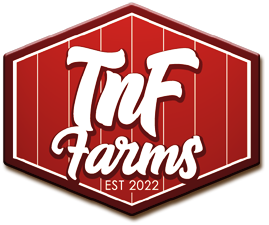
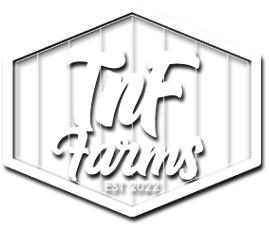
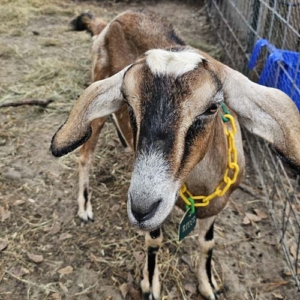
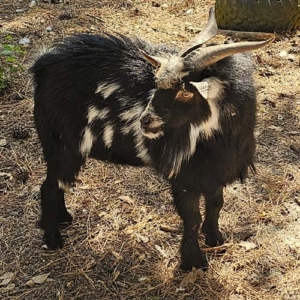
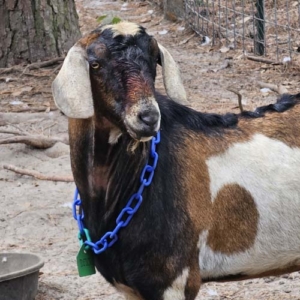
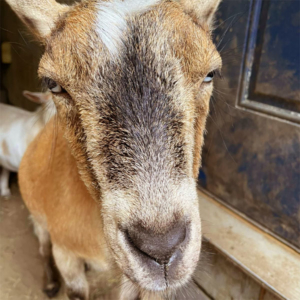
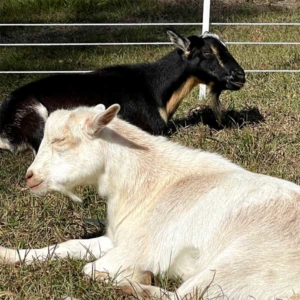
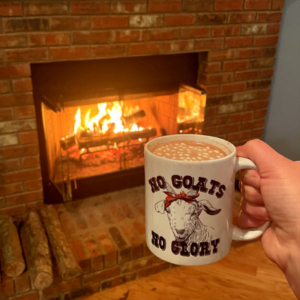
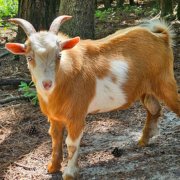
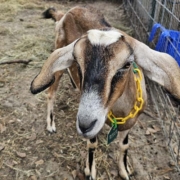
Farm Animals Make Life Better
/in American Guinea Hogs, Farm Animals, Florida Living, Nigerian Dwarf Goats, Nubian Goats, Poultry/by KaitlynI am a frequent visitor to TnF Farms, usually about once a month for a few days. I have been visiting the last few years since Tim and Faith moved to Tallahassee to start their farm. I am no stranger to farm life, as I have had horses growing up, and I much prefer it over city living. During my visits, I help Faith with farm chores, lend a helping hand on projects, become a goat midwife, and get my much-needed farm fix. I have always had a deep connection with animals in general, but there’s just something inherently special about farm animals.
Goat Friendly Florida Trees
/in Farm Animals, Florida Living, Homesteading, Nigerian Dwarf Goats, Nubian Goats/by FaithFlorida’s diverse and warm climate provides an excellent opportunity for goat farmers to integrate fruit trees into their farms. When selecting fruit trees for a goat farm in Florida, it’s essential to consider not only the climate but also the nutritional benefits these trees can offer to the goats. Here’s a more in-depth look at some suitable fruit trees:
Should You Grow Ryegrass?
/in American Guinea Hogs, Farm Animals, Homesteading, Nigerian Dwarf Goats, Nubian Goats, Poultry/by TimBeyond its role as a forage crop, rye grass plays a crucial role in environmental conservation. Its ability to prevent soil erosion, particularly on slopes or vulnerable terrain, has made it a preferred choice for cover cropping. As a cover crop, ryegrass forms a protective layer over the soil, reducing the risk of erosion and promoting soil health. Additionally, its quick growth makes it an effective ground cover in lawns and pastures, providing an aesthetically pleasing green carpet. Whether utilized for livestock feed, erosion control, or ornamental landscaping, ryegrass stands out as a resilient and adaptable grass species with multifaceted benefits.